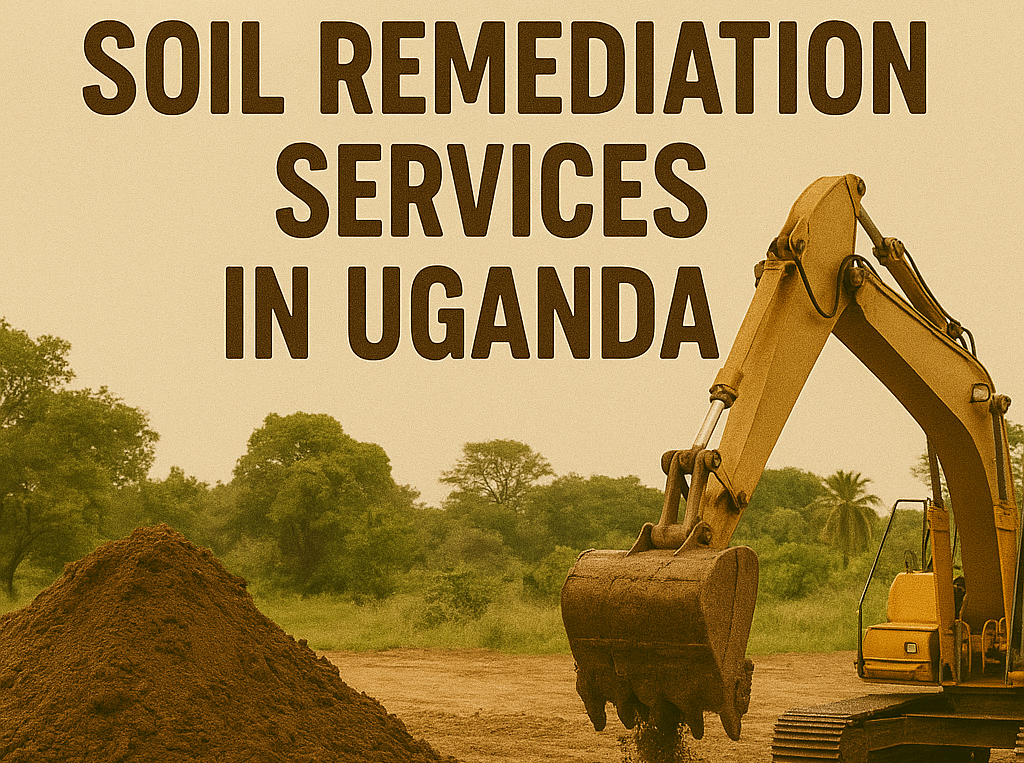Restoring Land and Protecting Water
Introduction
Uganda, known as the Pearl of Africa for its fertile soils, lakes, and rich biodiversity, is increasingly facing a serious environmental challenge soil and groundwater contamination. Agriculture is the backbone of the economy, but rapid population growth, oil exploration in the Albertine Graben, mining, and urban expansion have begun to place immense pressure on soil and water systems. From pesticide runoff into Lake Victoria to oil leaks in western Uganda, pollution is threatening food security, public health, and long-term sustainable development.
At The Ground Water Company, we provide specialized soil remediation services across Uganda. Our mission is to restore contaminated land, protect aquifers, and help industries, municipalities, and communities meet environmental standards while supporting Uganda’s future growth.
What Is Soil Remediation?
Soil remediation is the process of cleaning up and restoring contaminated soil to make it safe for people, plants, and animals. It’s commonly used at sites where industrial activities, chemical spills, or improper waste disposal have polluted the ground.
In Uganda, the most common soil contaminants include:
- Petroleum hydrocarbons – from oil exploration, refining, and transport in the Albertine region
- Heavy metals – from mining activities, especially in Karamoja and Kasese
- Chemical residues – from pesticides, fertilizers, and industrial effluents
- Salinity and nitrates – from irrigation practices and agricultural runoff in farming zones
Soil Contamination Challenges in Uganda
Uganda’s environmental and economic realities create distinct risks:
- Oil & Gas Exploration – The Albertine Graben oil fields bring risks of spills and leaks that pollute both soils and aquifers.
- Mining Operations – Gold, copper, and other mineral extraction contribute to heavy metal contamination in soils.
- Urban Growth – Kampala, Entebbe, and Gulu are expanding rapidly, generating waste and sewage challenges that impact soil quality.
- Agricultural Practices – Fertilizer and pesticide overuse, coupled with poor waste management, degrade soils in the fertile central and eastern regions.
- Water Resource Pressure – Pollution near Lake Victoria and the Nile Basin amplifies the risks, as millions rely on these water sources.
Our Soil Remediation Services in Uganda
At GWC, we design solutions tailored to Uganda’s diverse ecosystems and development needs:
- Site Assessment & Soil Testing
Soil sampling and analysis to identify contaminants
Risk assessment for human health and environment
Geotechnical surveys to understand soil structure
- Excavation & Disposal
Removal of contaminated soil
Transport to licensed disposal facilities
Landfill management or off-site treatment
3.In-Situ Remediation Services
Bioremediation (using microbes or plants)
Chemical oxidation/reduction
Soil vapor extraction
Phytoremediation
4.Ex-Situ Remediation Services
Soil washing
Thermal desorption
Stabilization
5.Water Treatment
Pump and treat systems
Permeable reactive barriers
Containment systems
6.Monitoring & Reporting
Post-remediation soil testing
Environmental monitoring
Regulatory reporting and documentation
Why Soil Remediation Matters in Uganda
- Protects Groundwater Security – Ensures safe aquifers for communities, agriculture, and industry
- Restores Agricultural Productivity – Keeps farmland fertile in a country where farming sustains most households
- Supports National Development Goals – Aligns with Uganda’s Vision 2040 for sustainable development and environmental protection
- Ensures Compliance – Helps industries meet Ugandan environmental laws and international best practices
- Safeguards Public Health – Reduces risks of toxin exposure and improves soil quality for rural and urban communities
Other Ground water Services We Provide in Uganda
Alongside soil remediation, GWC also offers:
- Ground water exploration
- Ground water recharge
- Ground water contamination
- Dewatering solutions
- Flooding solutions
- Hydrological studies
- Ground water seepage
- Ground water remediation
- Flood risk assessment
Conclusion
Uganda’s dependence on agriculture, coupled with growing oil and mining industries and rapid urbanization, makes soil and groundwater protection a national priority. Addressing contamination is not just an environmental responsibility it is central to food security, public health, and long-term economic resilience.


